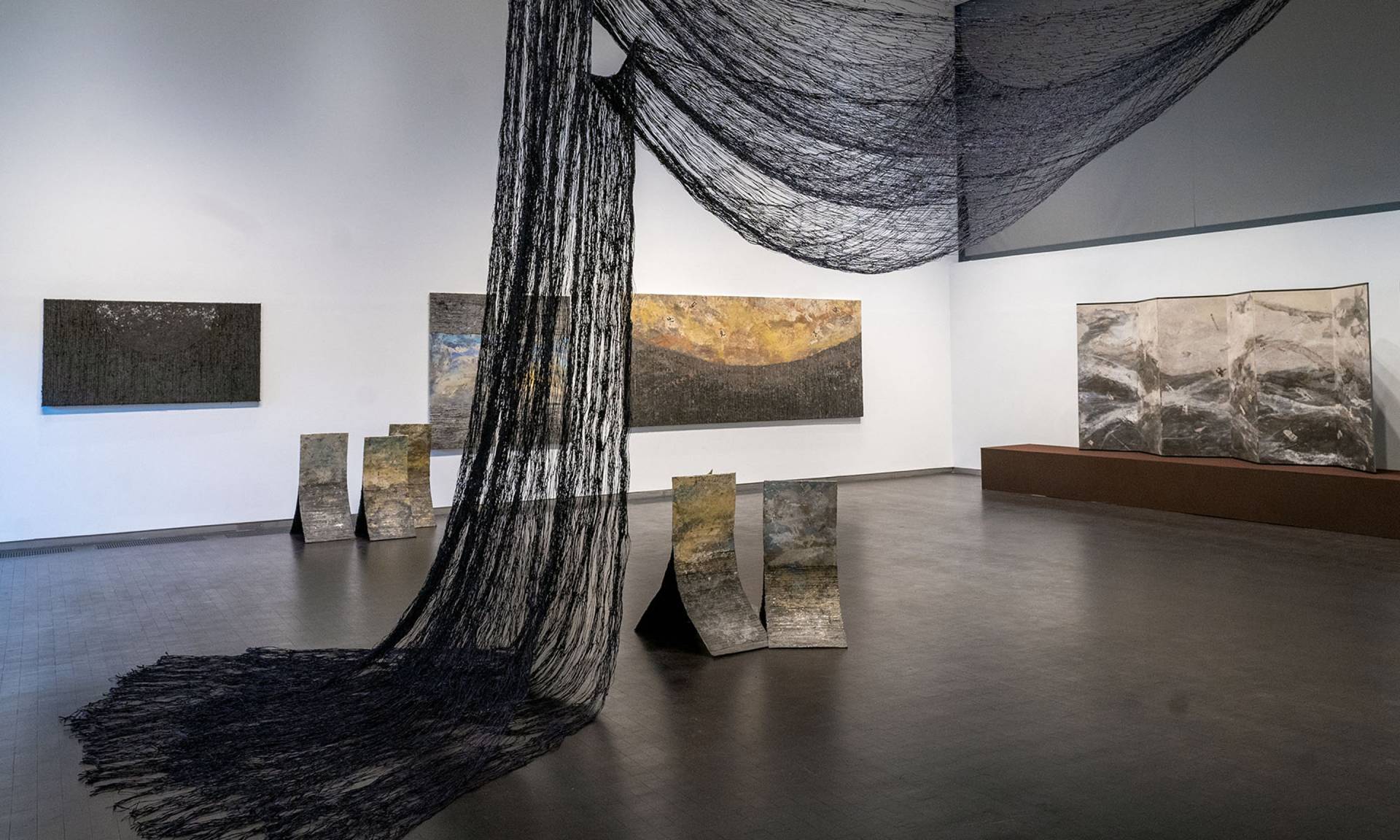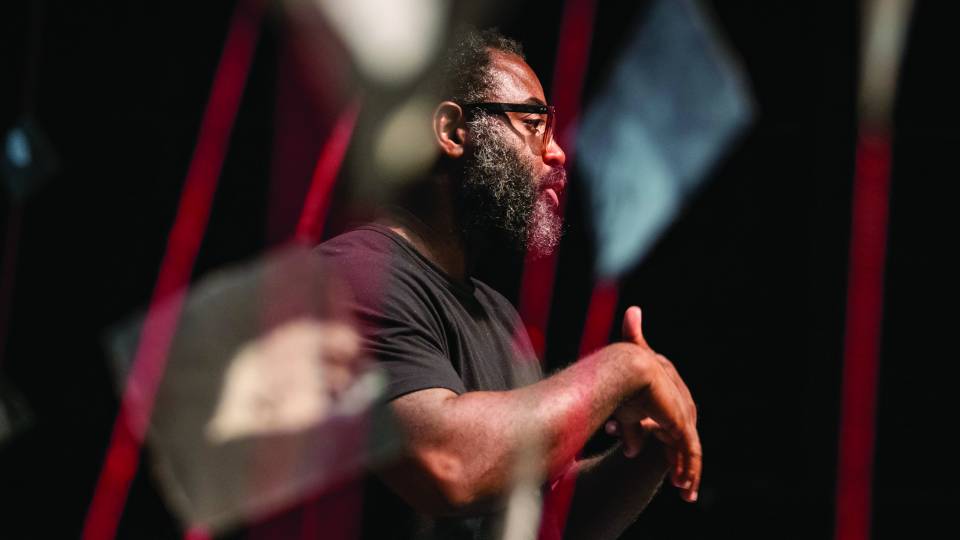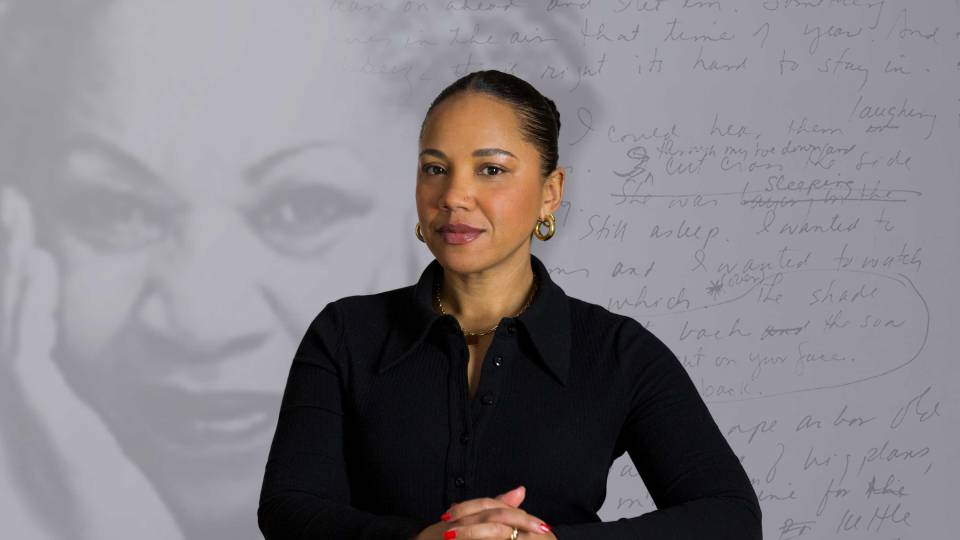Alone in solitary confinement as a teenager, Reginald Dwayne Betts called out to the other men being held in solitary: “Somebody, send me a book!” Moments later, Dudley Randall’s “The Black Poets” slid under his cell door.
Those pages started Betts’ transformation into a poet, lawyer and advocate for the rights of prisoners. Betts is the recipient of a 2018 Guggenheim Fellowship and 2021 MacArthur “Genius” Fellowship, and he is currently working on his Ph.D. in law at Yale University, where he earned his J.D. degree.
Now, 18 years after his release from prison, he explores the experience and consequences of his nine years of incarceration in a solo theater show based on his American Book Award-winning poetry collection, “Felon.”

Reginald Dwayne Betts explores the experience and consequences of his incarceration in a compelling solo theater piece "Felon: An American Washi Tale," based on his poetry collection "Felon," March 3-5, in McCarter Theatre Center's Berlind Theatre.
Performances of “Felon: An American Washi Tale” will take place March 2-4 at McCarter Theatre Center’s Berlind Theater. The theater piece — which was developed at Princeton’s Lewis Center for the Arts in summer 2021 — is a meditation on life after prison, criminal justice, artmaking and community.
The Princeton production serves as a focal point for many cross-campus collaborations and conversations around justice and incarceration. Post-performance events and a companion exhibition are cosponsored by and presented with numerous University departments, offices, and faculty- and student-led organizations.
“‘Felon: An American Washi Tale’ is an example of what theater does best,” said Jane Cox, director of the Lewis Center’s Program in Theater, a Tony Award-nominated lighting designer who is lighting designer for “Felon.” “It is serving as a way to bring people together around issues that affect us all. The performance explores and humanizes significant contemporary injustices.”
She continued: “We are particularly excited that this project has allowed our faculty, students and staff to enter into relationships with many other campus units and departments, as well as work side by side with justice-impacted communities and other off-campus communities.”
Affiliated programming for The Felon Project at Princeton includes talks after two of the three “Felon” performances, a celebration following the third show, and an exhibition of work made from traditional Japanese washi paper by “Felon” set designer and visual artist Kyoko Ibe. The schedule:
- Thursday, March 2. “Felon: An American Washi Tale” at 7 p.m. A post-performance panel discussion will be moderated by Lidal Dror, a post-doc in philosophy at Princeton. Panelists include Betts and other scholars and advocates focused on fundamental justice. The panel discussion is presented in collaboration with the University Center for Human Values. Caroline Subbiah, a member of the Class of 2023 whose senior thesis focuses on literature written in prison, will read an excerpt from a study of Betts’ work by Francisco Wills, who is currently incarcerated.
- Friday, March 3. “Felon: An American Washi Tale” at 7 p.m. A post-performance call-to-action conversation and reception will be led by Princeton's Prison Teaching Initiative in collaboration with Students for Prison Education, Abolition and Reform (SPEAR).
- Saturday, March 4. “Felon: An American Washi Tale” at 2:30 p.m. A joyful post-performance celebration will mark the anniversary of Betts’ release from prison, including a youth band from Camden.
- Now through March 5. “Washitales,” an exhibition of work made from traditional Japanese washi paper by “Felon” set designer and visual artist Kyoko Ibe, on view at the Lewis Center’s Hurley Gallery. The exhibition is presented in collaboration with the Department of Art and Archaeology and the Program in Visual Arts. At 6 p.m. on Feb. 23, Ibe and “Felon” director Elise Thoron will hold a launch event and discussion about their new book, “The Way of Washi Tales.”

“Washitales,” an exhibition of work made from traditional Japanese washi paper by “Felon” set designer and visual artist Kyoko Ibe, is on view in the Lewis Center for the Arts' Hurley Gallery, now through March 5.
Prior to the Saturday performance, Chesney Snow, who is a lecturer in theater in the Lewis Center for the Arts and a theater artist who helped to develop StoryLab at Rikers Island and works with the Fortune Society, will conduct theater-making workshops with high school students in the Princeton University Preparatory Program, Trenton high school students in the Trenton Arts at Princeton’s Trenton Youth Theater, students of the Fortune Society and student members of Princeton's own SPEAR group. Nathalie Charles, a member of the Class of 2025 who is involved in SPEAR, will assist Snow on the workshops with the high school students.
The many collaborators and partners across campus also include the Office of the Vice President for Campus Life, the School of Public and International Affairs, Princeton University Library, the Humanities Council, Campus Conversations on Identities (CCI) Fund, and McCarter Theatre Center. Other outreach partners include the Trenton Public Library, Princeton Public Library, Roundabout Workforce Development Program, and the Fortune Society.
From prison to law school and a life of advocacy
After his release from prison, Betts earned an MFA in creative writing from Warren Wilson College and his law degree from Yale. For more than 20 years, he has used his poetry and essays to explore the world of prison and the effects of violence and incarceration on American society. He is also the author of a memoir and two other collections of poetry.
He served on President Barack Obama’s Coordinating Council of the Office of Juvenile Justice and Delinquency Prevention.
In 2020, he founded Freedom Reads, a nonprofit organization that opens 500-book micro-libraries inside prison housing units across the country and brings contemporary writers and artists together with incarcerated audiences.
Other activities that are in the early planning stages are a return visit for Betts to bring a performance of “Felon” to a few local correctional facilities and to potentially install one or more Freedom Reads Libraries.
Paper, as set design and metaphor
Betts’ theater work, “Felon: An American Washi Tale,” begins with the pages of a book being slid into a cell. Paper is used in numerous ways for the production, including stoves made of toilet paper, “kites” (a slang moniker for letters received in prison) from a father, handwritten affidavits, legal complaints, handmade paper and certificates of pardon. Betts weaves traditional theater, poetry, fine art and Japanese paper making aesthetic principles into a meditation on his own experiences of incarceration and his legal work to free individuals still in prison.
The set itself, designed and created by Ibe, is built from 1,000 squares of "prison paper" that papermaker Ruth Lignen constructed using traditional Japanese washi papermaking techniques from the clothes of men Betts first met in prison. The paper kites hang suspended from floor to ceiling in various groupings around the spare set.
“Felon: An American Washi Tale” moves beyond Betts’ own life, unwrapping how prison touches everyone, as well as exploring the post-incarceration experience and lingering consequences of a criminal record.
Cox, who is organizing the series of events around University performances of “Felon: An American Washi Tale,” has been part of the production from the beginning. In summer 2021, she invited Betts and Thoron to develop “Felon” at the Wallace Theater on campus. The production has since begun touring around the country to correctional facilities and universities.
Princeton faculty member Tess James is co-designing the lighting with Cox for the Princeton production with sound design by Tony Award-nominated sound designer and composer Palmer Hefferan and stage management by Freedom Reads’ Tyler Sperrazza.




